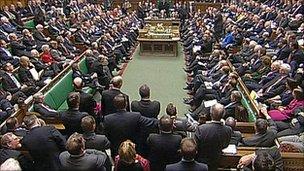Phone hacking: MPs to probe contempt of Parliament
- Published

An inquiry is to be launched into whether the hacking of MPs' phones amounts to contempt of Parliament.
The influential Standards and Privileges Committee was asked to look into the issue of MPs' phones being hacked in a Commons vote last week.
After meeting on Tuesday they said they would not look into specific cases - such as alleged hacking of MPs' phones by News of the World journalists.
Instead they will grill experts on whether hacking amounts to contempt.
The committee's remit is to look at potential breaches of Parliamentary privilege - the ancient law which protects MPs from prosecution for defamation.
MPs' conversations with each other would be covered by privilege but it would extend to telephone conversations with their constituents.
Scope of inquiry
If the committee decides that phone hacking does not amount to contempt of Parliament it would be expected to hold only a brief inquiry and would be unlikely to call any witnesses from the News of the World.
If the committee decided that there had been possible contempt of Parliament, a wider inquiry could be triggered.
Asked whether David Cameron's communications chief, former News of the World editor Andy Coulson, would be prepared to appear before the committee, Downing Street said: "The government will cooperate with any inquiry."
Unlike other Commons bodies, the standards committee, chaired by Labour MP Kevin Barron, has the power to compel witnesses to give evidence.
The committee will begin its work by hearing evidence from the Clerk of the House of Commons and legal and constitutional experts on whether and, in what circumstances, hacking of MP's phones could represent contempt of Parliament.
Only once it has reviewed this evidence, will it decide what further steps to take.
Police investigation
In a debate on the issue last week, Labour's Chris Bryant called on the committee to look into the number of MPs and ministers who may have had their messages hacked into, how widespread the practice was and whether the police acted properly in informing alleged victims.
Mr Bryant, who believes he was targeted, has asked the courts to review the Met Police's handling of its original investigation - which resulted in the conviction of the News of the World's former royal editor - and whether he should have been told his privacy risked being compromised.
The Met has defended the way it examined allegations against News of the World journalists and said it will consider new evidence including recent claims made by the paper's ex-reporter Sean Hoare.
Mr Hoare is set to be interviewed by the police after he alleged he was personally asked by the paper's former editor - and now No 10 director of communications Andy Coulson - to hack into people's phones.
Mr Coulson has insisted he never authorised nor was aware of phone hacking while he was editor and has received strong backing from No 10.
It is thought the Standards Committee would consult the police before deciding whether a wider inquiry was necessary.
The Home Affairs Committee is to conduct a separate inquiry into existing laws relating to unlawful interception of phone messages and how police respond to complaints.
- Published6 September 2010
- Published4 August 2012
- Published6 September 2010
- Published6 September 2010